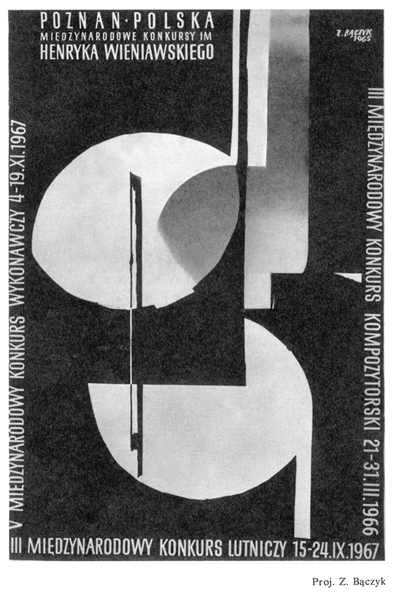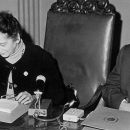5th International Henryk Wieniawski Violin Competition
Poznań, 4-19 November 1967
Watch a documentary about the competition:
"Victoriuos Pole”, “Triumph of Polish School”, “Polish Violin...”; it was with such enthusiastic titles that newspapers summed up the fifth edition of the Wieniawski Competition. For the first time a Pole, the sixteen-year-old Piotr Janowski from Grudziądz, had won the event. Janowski studied with Irena Dubiska, a great artist of almost legendary stature. Though pleased with her student’s victory, the experienced teacher made a sober comment on his success: “There is still work for us to do [...], I believe Piotr realizes that”. We know that the player, who was soon to settle in America, and play in Poznań again only after 30 years, remembered the words of his Maestra very well. However, the pace of his life was probably too fast and too intensive. The artist died on 6 December 2008 in London at the age of 57. Neither did the remaining two Polish laureates: the 18-year-old Kaja Danczowska, who left Poznań with the 3rd Prize, and the 20-year-old Michał Grabarczyk, who walked away with the 6th. For a long time professors, both are still active on stage and in their classes at different Polish music academies. We also remember that the fifth edition opened with Paganini’s Concerto performed by Konstanty Andrzej Kulka, who had just won the Gold Medal Diploma at the famous German ARD Radio Competition in Munich. “I was so moved by his performance”, later said Henryk Szeryng, who debuted at the Wieniawski Competition as a member of the jury, “that I instantly sent a telegram to my agent to recommend him. I had not heard this talented a player in years...” “Why isn’t he competing in the Wieniawski Competition?“ asked some.
Deputy Chairman of the Jury, the Swiss composer Henri Gagnebin, then the President of the World Federation of International Music Competitions in Geneva, spared no compliments, either. He was amazed that as many as eleven Polish players entered the competition. “Very few countries can accomplish that. It shows the quality of Polish violin schooling, as well as the talent of the Polish nation”, he said in a press interview. It was also Grażyna Bacewicz, the head of the Competition Jury, who joined the chorus of admiration, partially also praising the competition organizers. “Had our team for the Wieniawski Competition been twice as numerous”, she said, “it would not have had a negative effect upon the event’s performance level...” However, when a journalist asked why so few international players took part in the competition, the composer came up with a very matter-of-fact diagnosis of the situation: “Above all, the Wieniawski Competitions must be more extensively promoted“, she stated. “Particularly in countries outside Europe this event remains practically unknown. Some of these countries, e.g. Japan, are traditionally interested in the Polish culture, and would most certainly take part in the competition. We also see a necessity for certain changes in the list of works to be selected by the candidates. Besides, competition programmes should be distributed by our cultural centres abroad at least two years before the event”.
“Indeed”, one might feel like saying. For a long time these words have been an obvious thing for the team of the Wieniawski Society of Poznañ, the organiser of the competition’s subsequent editions. Almost forty years ago this advice was taken to heart. It took some time, though, before one could see its effects.
source: R. Połczyński, Da Capo. 75 lat Międzynarodowych Konkursów im. Henryka Wieniawskiego
Read more about the 5th Competition (PDF, 768 KB) >

A poster of 5th edition of Wieniawski Violin Competition designed by Z. Bączyk.
JURY
MEMBERS
Chairman: Grażyna Bacewicz (Poland)
Irena Dubiska (Poland)
Jean Fournier (France
)
Henri Gagnebin (Switzerland
)
Tibor Gašparek (Czechoslovakia)
Ionel Geanta (Roumunia)
Josef Gingold (USA)
Frederick Grinke (Great Britain)
Jurij Jankielewicz (USSR)
Emil Kamiłarow (Bulgaria)
Bela Katona (Hungary)
Egon Morbitzer (GDR
)
Remy Principe (Italy
)
Edward Statkiewicz (Poland
)
Henryk
Szeryng ( Mexico)
Eugenia Umińska (Poland)
Tadeusz Wroński (Poland)
PRIZE WINNERS
1st prize: Piotr JANOWSKI
(Poland
)
2nd prize: Mikhail
BEZVERKHNY (USSR
)
3rd prize: Kaja DANCZOWSKA
(Poland
)
4th prize: Eduard
TATEVOSIAN (USSR)
5th prize: Anatoli
MELNIKOV (USSR)
6th prize: Michał
GRABARCZYK (Poland), Mincho MINCHEV
(Bulgaria)
Awards: Maria Brylanka (Poland); Ginka Giczkowa (Bulgaria); Małgorzata Błażejewska (Poland)






















